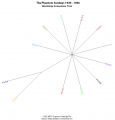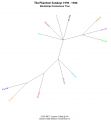Spotlight on stylometric text analysis
Stylometry
Different authors have different writing styles. Like the lenght of words and sentence, the frequencies of word, the frequencies of word forms, the richness of vocabulary, the use of punctuation and on. The author can also have preferences for certain spelling variants or using certain expressions.
Stylometry is the study of measurable features of style.
The Story of the Phantom
The Story of the Phantom is a series of 15 novels, published by Avon Publications in the U.S. from 1972 to 1975, based on Lee Falk's Phantom stories. When released the adaptor of issues 2 and 10 was not credited, and issue 15 was credited as Carson Bingham. Lee Falk did correct this using an "Author's note" in the books.
| Adapted by | issues | note |
|---|---|---|
| Basil Copper | 2, 3 | #2 The adaptor is not credited |
| Carson Bingham | 14 | |
| Frank S. Shawn | 4, 5, 7, 8, 10, 11 | #10 The adaptor is not credited |
| Lee Falk | 1, 6, 9, 12, 15 | #15 is wrongly credited as Carson Bingham |
| Warren Shanahan | 13 |
Analysis
Stylometric analysis to see if Lee Falk's correction in the "Author's note" can been confirmed.
- MFW - most frequent words
- MFC - most frequent characters
- n-Grams - Sample for character 2-grams: The Phantom said = th,he,e , p,ph,ha,an,nt, etc. Sample for word 2-grams: Hello, the Phantom said = hello the,the phantom,phantom said, etc.
- Corpus - collection of text. Here the 15 novels, from chapter 1 to the end of the novel.
Using JGAAP
The novels were prepared adding the novels to each of the authors, leaving issues 2, 10 and 15 as unknown authors. Using character 4-grams with nearest neighbor driver with metric Cosine Distance, issues 2, 10 and 15 were compared to the known authors.
The result were that the most likly author for: #2 is Basil Cooper, #10 is Frank S Shawn and #15 is Lee Falk.
Using R
The novels were put into one corpus folder. Two analysis were done: first 0-902 MFW 2-gram and the second 0-902 MFC 3-grams. Both using the Boostrap Consensus Tree.
The result grouping the novels according to the table above, confirming Lee Falk's correction in the "Author's note".
Interesting the analysis grouping issues 13 and 14 with statistic similar style.
King Comics stories
When the Mandrake the Magician series were published by King Comics in 1966-1967 the writers of the stories were uncredited.
At Who Created the Comic Books? - A Mandrake Writer Martin O'Hearn mentions that singular expressions like: "Suffering Hannah", "Great suffering Caesar", "Y-yipes" and "Thunderation" were interjections Dick Wood usen in several other non-Mandrake stories. In addition Martin O'Hearn also mentions that Jerry Siegel told that he wrote one Mandrake story. In Robin Snyder's The Comics Vol 27, No.2 (February 2016), Gary Poole is listed for several of the Mandrake stories.
Looking at the Mandrake series at GCD the writer of two Mandrake stories still are unknown: "The Phantom Casino" and "The Black Wizard". But "Great suffering Caesar" and "Y-yipes" are used in "The Phantom Casino", so it should be written by Wood. I addition also two stories in the Flash Gordon series: "The Laughing Clown Caper", "The Little Giant" and the "Midnight with Mandrake" from the Phantom series.
Analysis
Using R
The corpus consists of:
- the Mandrake stories from the Mandrake series, with the exception of the translated stories in issues 8 and 9.
- the shorter Mandrake stories from the Phantom and Flash Gordon series.
- 3 pages from the unpublished Mandrake story "Seeing is Believing"
- the 4 Phantom stories printed in the Mandrake series: "SOS Phantom", "The Pirate Raiders", "The Magic Ivory Cage" and "The Girl Phantom". The last one possible by Dick Wood.
- the 5 part Secret Agent X-9 story from the Flash Gordon issues 4-8. First part written by Archie Goodwin. And from third part written by Gary Poole.
The analysis is Bootstrap Consensus Tree using 50-1000 MFW 2-grams and MFC 3-grams.
The MFW analysis branches early into the length of the stories and then into the genre, but also listing the ordinary Mandrake stories according to the writers. The analysis indicates the:
- Gary Poole wrote the "The Black Wizard".
The shorter stories branches more genre related, possible indicating that:
- Gary Poole wrote the "Midnight with Mandrake" from Flash Gordon and the unpublished "Seeing is Believing".
- "The Laughing Clown Caper" and "The Little Giant" branches with "Midnight with Mandrake" (By Dick Wood ?) from Flash Gordon, but it could also be an unknown writer for the two stories.
- The four Phantom stories branches for themself with "The Girl Phantom" (By Dick Wood ?) close to "SOS Phantom", followed by "The Pirate Raiders" and "The Magic Ivory Cage". It could also be an unknown writer for the two last stories.
Interesting, the 5 part X-9 story branches for Gary Poole as writer for part 3 and 4, and Archie Goodwin of part 1, 2 and 5.
The MFC shows a slightly different context. The analysis grouping most of the stories according the the known writers. The analysis indicate:
- Gary Poole as the writer of the Mandrake stories: "Midnight with Mandrake", the unpublished "Seeing is Believing" and "The Black Wizard". And for the Phantom stories: "The Pirate Raiders" and perhaps also "SOS Phantom".
- "The Girl Phantom" and "The Magic Ivory Cage" have their own branch, if not written by Wood indicating an unknown writer.
- "The Laughing Clown Caper" and "The Little Giant" branches together, if not written by Wood indicating an unknown writer.
- Unexpected, the "Specter from Space" (by Wood) and "The Fear Mongers" (by Poole) branches together.
Interesting, the 5 part X-9 story branches for part 1 and 2 with Archie Goodwin as the writer, and Gary Poole for part 3 and 5.
WWII
Without giving further details, Alfred Bester told that he ghosted Falk’s strips during the WWII years. Lee Falk worked for OWI early 1942 to August 1943. He then wrote the "Passionate Congressman" and several scripts for his newspaper characters, before he was enlisted as private in the army in March 1944 (to about mid 1945).
The Phantom Sundays
The text in the comic strips are a bit different than the previous novels. In the novels the dialogues looking about this: "Hello," said the Phantom. But in the Sunday stories the speech bubble are more like this: Hello!
| PS | Start | Finish | Weeks | Story Title | note |
|---|---|---|---|---|---|
| ps-002 | 22.10.1939 | 10.03.1940 | 21 | "The Precious Cargo of Colonel Winn" | |
| ps-003 | 17.03.1940 | 21.07.1940 | 19 | "The Fire Goddess" | |
| ps-004 | 28.07.1940 | 29.12.1940 | 23 | "The Beachcomber" | |
| ps-005 | 05.01.1941 | 23.02.1941 | 8 | "The Saboteurs" | |
| ps-006 | 02.03.1941 | 22.02.1942 | 52 | "The Return of the Sky Band" | |
| ps-007 | 01.03.1942 | 11.10.1942 | 33 | "The Impostor" | at OWI |
| ps-008 | 18.10.1942 | 18.04.1943 | 27 | The Marshall Sisters Pt.1: "Castle in the Clouds" | at OWI |
| ps-009 | 25.04.1943 | 04.07.1943 | 11 | The Marshall Sisters Pt.2: "The Ismani Cannibals" | at OWI |
| ps-010 | 11.07.1943 | 25.06.1944 | 51 | The Marshall Sisters Pt.3: "Hamid the Terrible" | at OWI |
| ps-011 | 02.07.1944 | 07.01.1945 | 28 | "The Childhood of the Phantom" | in the army |
| ps-012 | 14.01.1945 | 24.06.1945 | 24 | "The Golden Princess" | in the army |
| ps-013 | 01.07.1945 | 02.12.1945 | 23 | "The Strange Fisherman" | in the army ? |
| ps-014 | 09.12.1945 | 17.03.1946 | 15 | "Queen Pera the Perfect" |
Using R
The text from the Sundays (2-14) were put into one corpus folder. Two analysis were done: first 0-902 MFW 2-gram and the second 0-902 MFC 3-grams. Both using the Boostrap Consensus Tree.
The result for the MFW 2-grams grouping all stories close in writing style. The MFC 3-grams shows a slightly larger variation, but this is most likely due to the ammount of dialogues from different characters in the stories.
The analysis shows no clear indication that anyone other than Lee Falk was the author of these stories.



